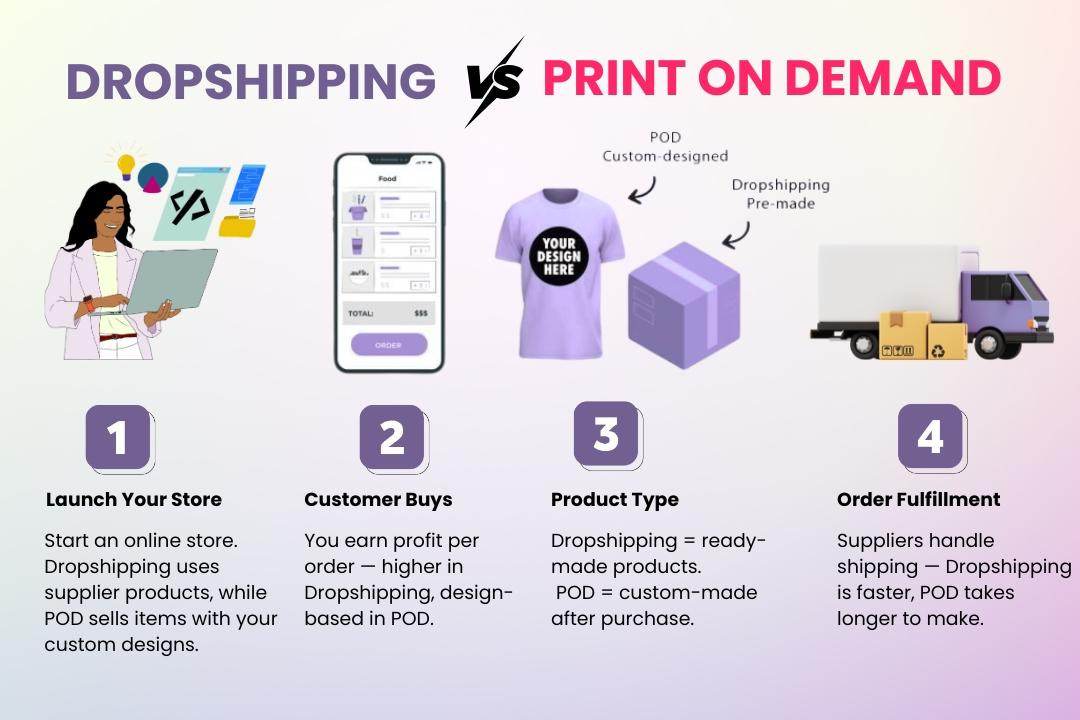
Dropshipping vs Print on Demand: Which Model is Right for You in 2025?
01 May 2025
When stepping into the world of ecommerce, choosing the right business model can set the tone for your success. Two of the most popular options today are Dropshipping and Print on Demand (POD). While both models have their unique advantages, understanding their differences and how they align with your goals is crucial, especially in 2025, as ecommerce trends continue to evolve.
This guide will walk you through the essentials of both models—highlighting their pros, cons, and key differences—so you can determine which one fits your aspirations.
What is Dropshipping?
Dropshipping is an ecommerce model where you partner with suppliers or wholesalers to sell products directly to customers—without holding any inventory. When a customer places an order, the supplier manages shipping and fulfillment.
Pros of Dropshipping
- Low Initial Investment
Since you’re not purchasing inventory upfront, you can start your business with minimal capital.
- Wide Product Variety
You can sell anything from electronics to fashion, offering thousands of products across niches.
- No Inventory Management
All storage, packaging, and shipping are handled by your supplier, saving time and effort.
- Flexibility
Easily change or expand your product offerings without additional costs or risks.
Cons of Dropshipping
- Lower Profit Margins
Because you rely on suppliers, your profit margins might take a hit due to competitive pricing and fees.
- Less Control Over Shipping
The dependence on suppliers means you have little influence over delivery times and processes, which might lead to customer dissatisfaction.
- Intense Competition
Popular niches often have high competition, making it harder to stand out.
- Reliance on Suppliers
If the supplier fails to deliver products on time or maintain quality, it directly impacts your store’s reputation.
What is Print on Demand (POD)?
Print on Demand is a business model where you create custom designs that are printed on products like t-shirts, mugs, or phone cases only after a customer places an order. Similar to dropshipping, the fulfillment process—including printing and shipping—is handled by a third-party provider.
Pros of Print on Demand
- Low Investment in Inventory
Like dropshipping, you don’t need to purchase stock upfront. Products are created on order.
- Creative Control
You have full creative freedom to design unique, on-brand products.
- Niche Targeting
Build a brand focused on a particular audience, such as gamers, pet lovers, or fitness enthusiasts.
- Fewer Product Variants
Focused product offerings can simplify your operational needs, reducing overwhelm.
Cons of Print on Demand
- Higher Product Costs
Custom designs typically cost more to produce, which might reduce profitability unless priced accordingly.
- Limited Product Range
While POD focuses on branded merchandise, you might not have as much variety compared to dropshipping.
- Design Time
The creative process, while rewarding, can be time-consuming and requires some graphic design skills.
- Delivery Times
Printing after purchase can extend the order fulfillment process compared to premade products.
Dropshipping vs Print on Demand: Key Differences
| Feature | Dropshipping | Print on Demand |
|---|---|---|
| Investment Cost | Low | Low |
| Product Range | Wide | Limited but custom-designed |
| Brand Building | Moderate customization | High customization with unique designs |
| Profit Margins | Lower due to competitive pricing | Higher if targeting niche audiences effectively |
| Ease of Entry | Quick and simple setup | Requires design knowledge |
| Control Over Products | Minimal | Full control over design |
Factors to Consider When Choosing Between Dropshipping and Print on Demand
1. Your Skill Set
- If you enjoy creating designs or have a background in graphic arts, POD might be the way to go.
- For those who prefer to focus on marketing without dealing with product creation, dropshipping may be a better fit.
2. Your Target Audience
Dropshipping is great for selling generic or trending consumer products to a broad audience. POD thrives when engaging niche markets with personalized, creative offerings.
3. Long-Term Business Goals
If you want to build a brand and scale with unique products, POD offers a stronger branding opportunity. If you're looking for a flexible way to start selling a variety of products quickly, consider dropshipping.
4. Profit Margins
Dropshipping profits are competitive and often volume-driven. POD profits depend heavily on the perceived value of your designs and ability to set premium pricing.
Which Ecommerce Model is Right for You in 2025?
The "right" model depends on your resources, goals, and skill set. If you're just starting out, experimenting with both might give you clarity. However:
Choose Dropshipping if you want a faster setup, minimal involvement in product creation, and access to a wide range of products.
Opt for Print on Demand if you're drawn to expressing creativity and building a strong, unique brand identity.
If you're aiming for a faster setup, minimal product involvement, and the flexibility to sell a wide range of trending items, Dropshipping is the model for you. It’s ideal for entrepreneurs who want to start lean, scale quickly, and focus on marketing without getting bogged down in logistics.
On the other hand, Print on Demand is best suited for those who want to express their creativity and build a brand through custom-designed apparel or merchandise—though it often requires more time and effort to establish a niche presence.
Ecommerce in 2025 continues to thrive, offering unmatched opportunities for those ready to adapt and grow. While both Dropshipping and Print on Demand have their own strengths, Dropshipping stands out as the smarter choice for most new entrepreneurs—thanks to its low entry barrier, scalability, and fast market testing capabilities.
Whether you're selling high-demand gadgets or trending lifestyle products, Dropshipping empowers you to act fast, pivot easily, and grow your business with confidence. So go ahead—take the leap into ecommerce, and claim your share of the booming digital marketplace.

